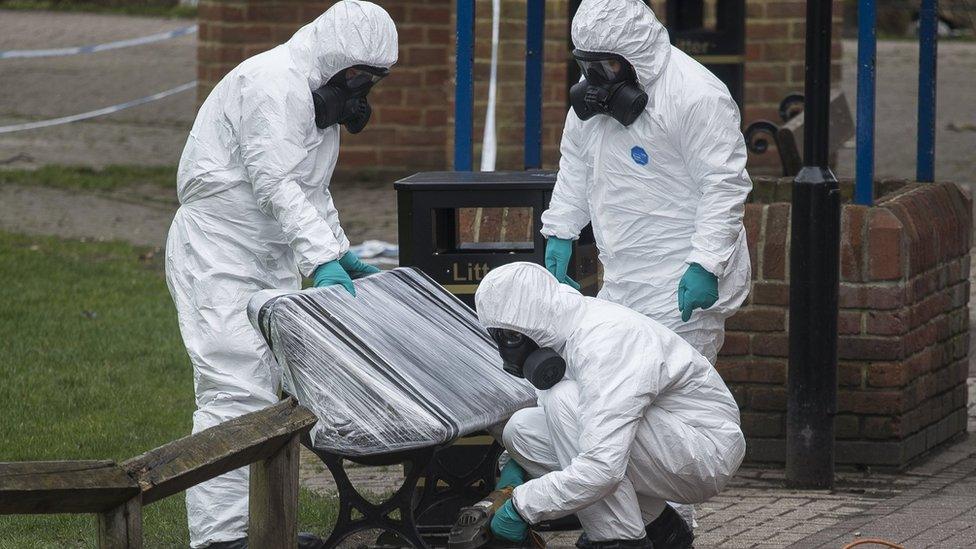Spy poisoning: Russia escalates spy row with new expulsions
- Published
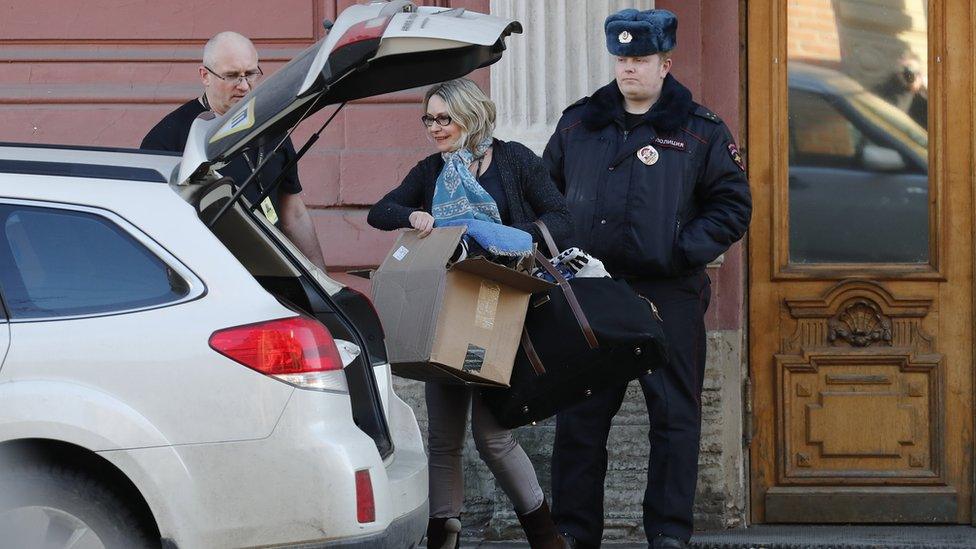
Russia is closing the US consulate in St Petersburg as part of its retaliatory measures
Russia has announced further measures against UK diplomats while at the same time declaring tit-for-tat expulsions of officials from 23 other countries.
It has told the British ambassador to cut staffing to the size of the Russian mission in the UK.
Moscow has rejected UK accusations that it is behind the nerve agent attack on an ex-spy and his daughter in the UK.
However, some 150 Russians have since been expelled by mainly Western countries.
Russia initially hit back at the UK, but then announced 60 US expulsions. On Friday it called in a string of foreign ambassadors with news that their own countries' measures were being matched.
Sergei Skripal and his daughter Yulia collapsed in Salisbury, England, on 4 March. Mr Skripal remains in a critical but stable condition. Yulia's condition is said to be improving.
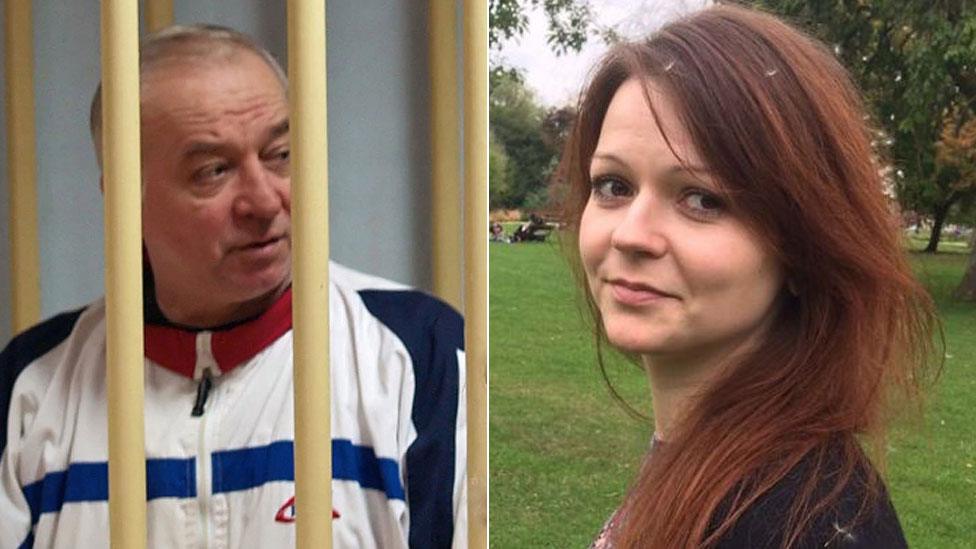
Sergei Skripal, 66, and his daughter Yulia, 33, have been in hospital since the attack
UN Secretary General Antonio Guterres on Thursday issued a warning over "a situation that is similar, to a large extent, to what we lived during the Cold War".
In another development, Russia accused British customs officers of trying to search an Aeroflot airliner arriving from Moscow at London's Heathrow airport without allowing the crew to be present.

Russia singles out UK again
By Paul Adams, BBC News, Moscow
British diplomats left Moscow a week ago, but ambassador Laurie Bristow was summoned back to the foreign ministry for additional punishment.
It's not immediately obvious what it means in practice, but it's clear that Russia sees Britain as the ringleader of an international conspiracy which resulted in the biggest mass expulsion of Russian diplomats in history.
Britain's "provocative and unjustified actions", the ministry said, had "inspired the unfounded expulsion of Russian diplomats".
It's a backhanded compliment to Prime Minister Theresa May, who has successfully corralled a wider international coalition than anyone would have thought possible a month ago.
Russia has railed against the British government over its efforts to internationalise what officials here call "the so-called Skripal affair". The solidarity expressed by so many countries has been dismissed as a result of financial and political pressure, orchestrated in tandem with the US.
Which other countries are involved?
Twenty-nine countries have expelled 145 Russian officials in solidarity with the UK - and Nato has also ordered 10 Russians out of its mission in Belgium.
The US expelled the largest single number - 60 diplomats - and closed the Russian consulate general in Seattle.
Russia reciprocated on Thursday declaring 58 US diplomats in Moscow and two in the city of Yekaterinburg to be "personae non gratae". It also announced the closure of the US consulate in St Petersburg.
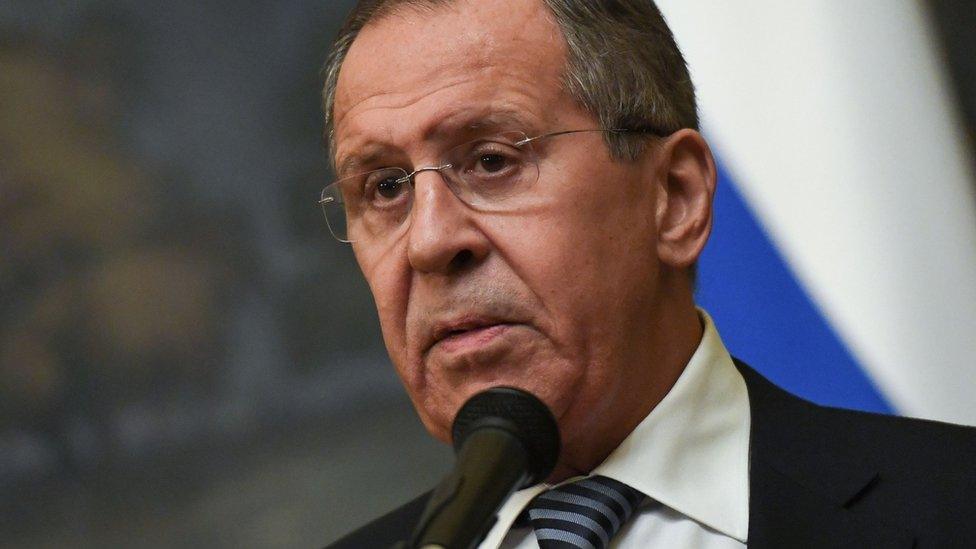
Foreign Minister Sergei Lavrov said Russia would respond "in kind"
The US said it had been expecting the move and warned it may take further action.
On Friday, ambassadors from Albania, Australia, Canada, Croatia, the Czech Republic, Denmark, Estonia, Finland, France, Germany, Ireland, Italy, Latvia, Lithuania, Macedonia, Moldova, the Netherlands, Norway, Poland, Romania, Spain, Sweden and Ukraine were told to send home staff from their missions - corresponding to the same number of Russians their countries had expelled.
A statement by the Russian foreign ministry also said that Russia "reserves the right to take retaliatory measures" against Belgium, Hungary, Georgia and Montenegro - countries that had joined the co-ordinated action against Russia "at the last moment".
What is Russia's argument?
Russian Foreign Minister Sergei Lavrov has blamed "harsh pressure from the United States and Britain under the pretext of the so-called Skripal case".
He reiterated Russian calls for consular access to Yulia Skripal - a Russian citizen.
Russia, he said, was also seeking a meeting with leaders of the Organisation for the Prohibition of Chemical Weapons (OPCW) to "establish the truth".
On Friday, in addition to the new Western expulsions, UK Ambassador Laurie Bristow was handed a protest note that said Britain's "provocative actions" had led to the decision by other governments to expel Russians.
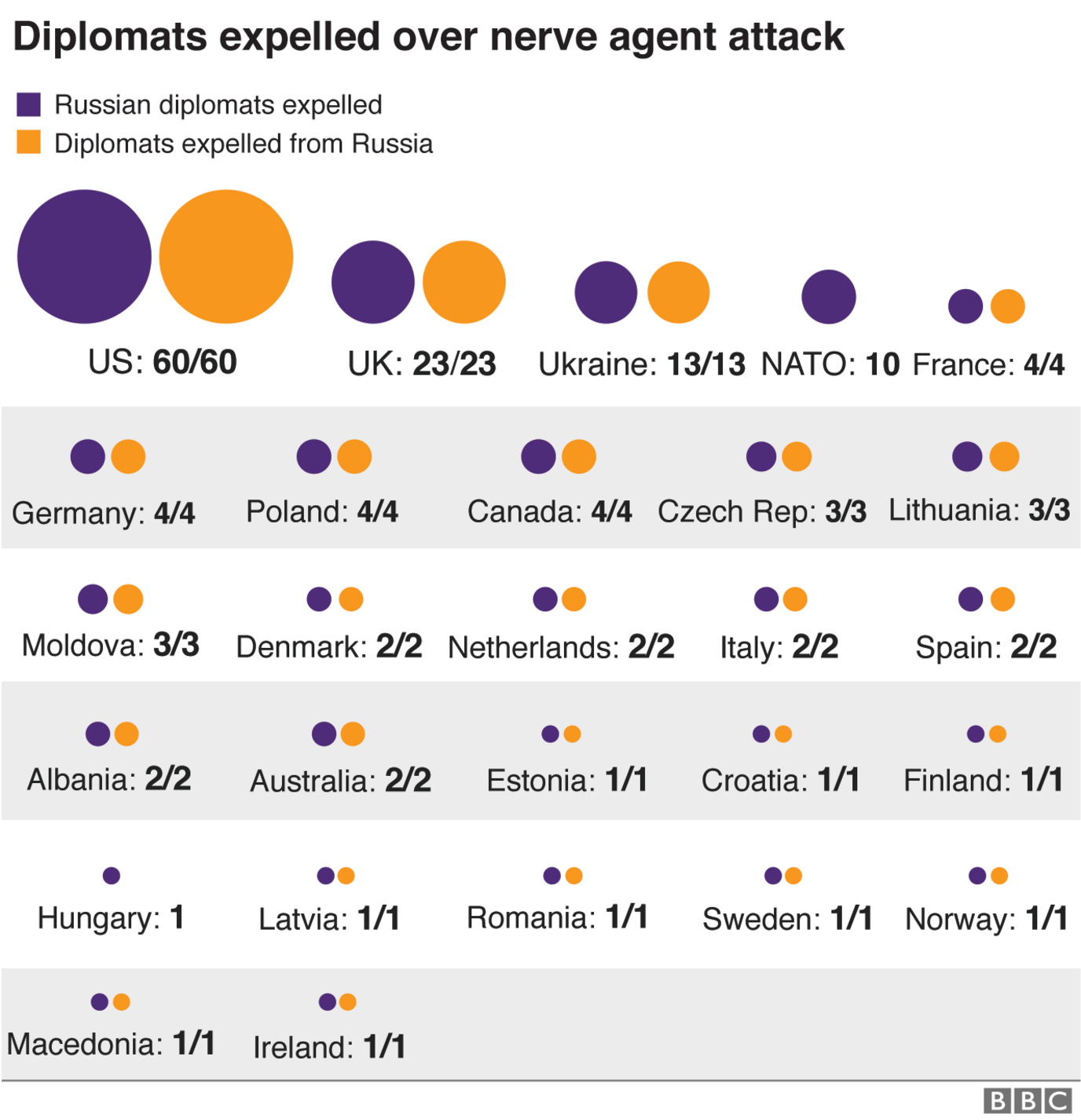

It is not clear how many more British officials will have to leave. Before the expulsion of the 23 Russians, the UK's Foreign Office listed 60 Russian officials working in the UK.
Another four are posted at the Russian consulate general in Edinburgh.
UK National Security Adviser Mark Sedwill has said expulsions by Western countries are aimed at rooting out covert Russian intelligence networks.
What happened on the plane?
The Russian news agency Interfax quoted an unnamed source as saying British "police" had boarded the jet once passengers had disembarked and had "demanded" the crew leave so that they could conduct a search.
The Russian embassy in London said later in a statement that British customs officers had boarded the plane and tried to search it "without the crew being present".
"After an Embassy officer arrived at the airport long negotiations were conducted that allowed to ensure the right of the captain to be take part in the search," it added.
Russia's foreign ministry called it "the next provocation" following the fallout from the Skripal affair.
There was no immediate official British comment on the Russian accusations but London's Metropolitan Police denied its officers had searched a plane arriving from Moscow.
Allow X content?
This article contains content provided by X. We ask for your permission before anything is loaded, as they may be using cookies and other technologies. You may want to read X’s cookie policy, external and privacy policy, external before accepting. To view this content choose ‘accept and continue’.
The plane later left for Moscow, Interfax said.
What do we know about the nerve agent?
Britain says the chemical used in the attack was part of a group of nerve agents developed by the Soviet Union known as Novichok.
OPCW has sent a team to the UK to investigate samples of the agent Britain says was used.
The results are expected to take a minimum of two weeks, the government says.
Police say the Skripals first came into contact with the nerve agent at Mr Skripal's home in Salisbury, with the highest concentration found on the front door.
- Published30 March 2018
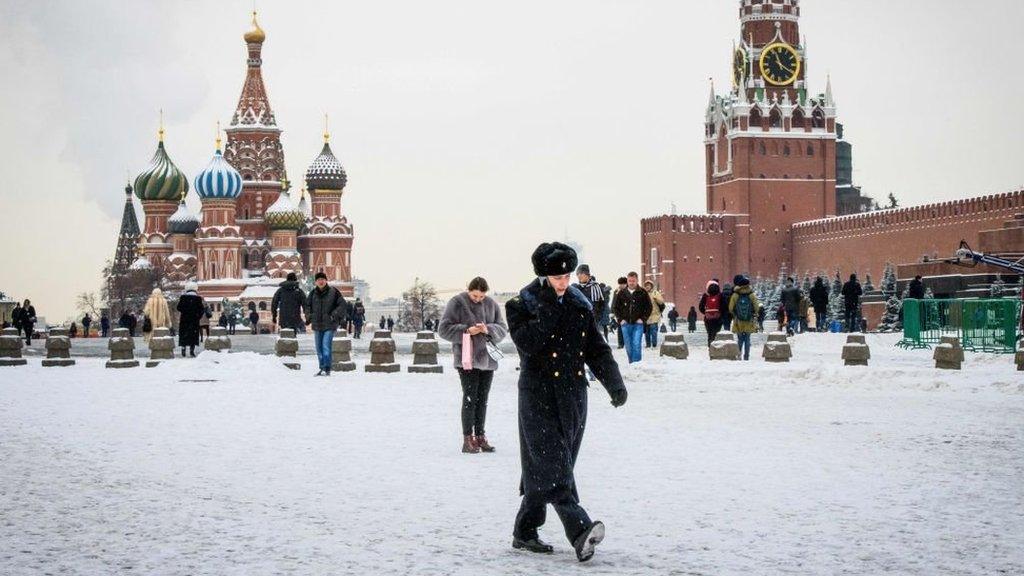
- Published23 March 2018
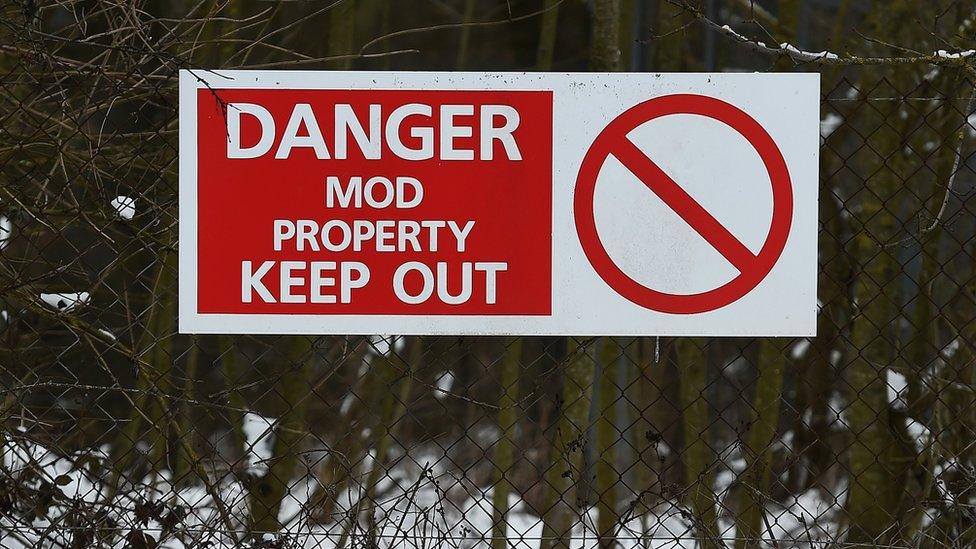
- Published23 March 2018
- Published24 March 2018
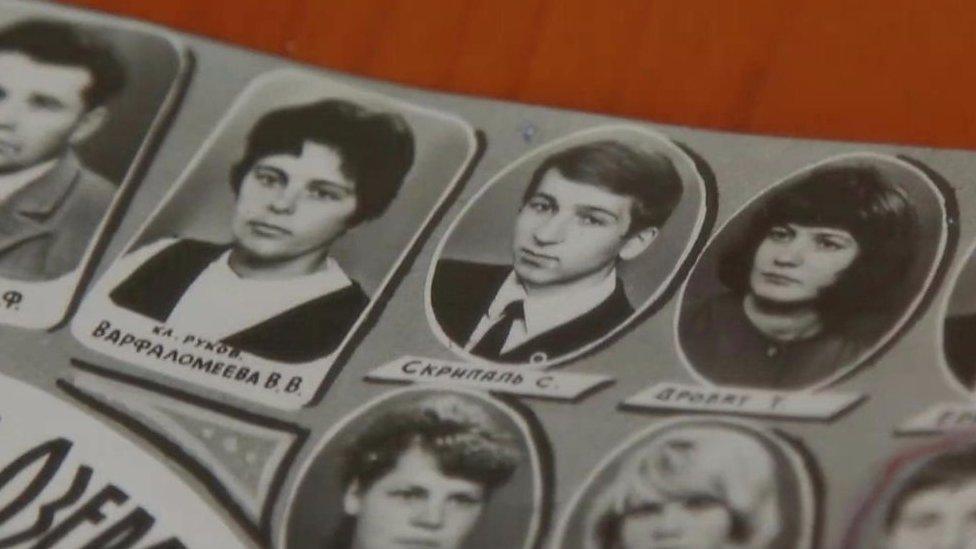
- Published24 March 2018
